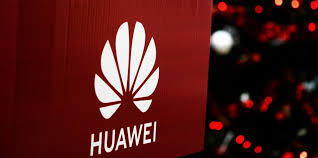Even as Europeans and Asians join Trump’s ban, the Chinese company continues to prosper from the continent’s move toward 5G.
A year ago in June, South African President Cyril Ramaphosa got a letter that painted an alarming picture of his country’s economic prospects. The leaders of the country’s four largest telecommunications companies wrote that South Africa risked “unintended and harmful consequences” from President Trump’s plans to bar Chinese network equipment maker Huawei Technologies Co. from doing business with U.S. companies. The leaders implored Ramaphosa to undertake an “urgent intervention” to avoid damaging fallout to South Africa and the rest of continent.
Ramaphosa soon threw his weight behind the request and defended Huawei, calling it a victim of the U.S. trade war with China. “We support a company that is going to take our country, and indeed the world, to better technologies, and that is 5G,” he said at an economics summit. “We cannot afford to have our economy to be held back because of this fight.”
Kenya, Ethiopia, and other countries across the region have followed Ramaphosa’s example, and Huawei hasn’t lost a single order in Africa, where the company has been operating for more than two decades and has become a central pillar of the continent’s growth ambitions.
“Huawei is a uniquely positioned partner for Africa,” says Cobus van Staden, a researcher at the South African Institute of International Affairs. Huawei sells reliable products ranging from undersea cabling to mobile phones, and it can offer attractive financing backed by the Chinese state, van Staden says. “I don’t see another partner being able to bring all of this to the table,” he says.
The unwavering support for Huawei contrasts with the company’s fortunes elsewhere after a relentless White House campaign urging allies to shun the vendor. Last month the U.K. government said carriers must remove Huawei’s 5G gear from their networks by the end of 2027, and Japan and Australia have also joined the boycott. But Europe’s biggest economy—Germany—has shied away from an outright ban for fear of economic retaliation from China, a major export market for German goods.
There’s still some risk for Huawei in Africa as the continent’s top carriers have a growing international profile. South Africa’s Vodacom Group Ltd., which is present in more than a dozen countries across the region, is a subsidiary of U.K. mobile giant Vodafone Group Plc. Rival MTN has stakes in carriers in 17 African countries and is the continent’s largest operator. As those companies start to build their 5G networks in South Africa and elsewhere, they may face increasing pressure to shift away from the Chinese company in favor of Nokia Oyj and Ericsson AB—both of which have also sold equipment to the two carriers.
Yet Huawei remains the top vendor in Africa, not least because its equipment has a reputation for being cheap and robust and because it has experience working in remote areas. The company’s long-term ties have made it an indispensable partner for many governments, helping it build a stronger foothold in Africa than Nokia and Ericsson.
“Huawei equipment makes up something like 70% of wireless broadband infrastructure across Africa, and it has a close relationship with mobile network operators throughout the continent,” says Arthur Goldstuck, managing director at researcher World Wide Worx. “Only those organizations with direct and significant exposure to the U.S. are likely to side against China in this regard.”
In a region with strained government budgets, Huawei entered the market with favorable financing deals that allowed it to win customers building out earlier generations of wireless technology, according to telecommunications advisory firm Africa Analysis. That initial opening made Huawei the natural choice when it came time to upgrade to 5G, which promises super-high-speed connectivity.
While about 300 million people in sub-Saharan Africa lived in areas with no mobile broadband coverage in 2018, networks there are improving. The share of the population with access to faster 4G coverage rose from just 9% in 2014 to 34% in 2018, according to the GSMA mobile industry association.
As the 5G buildout begins, U.S. government officials warn that Huawei could use its growing share of the telecommunications equipment market to spy for China, though Huawei denies any spying or even talking with the Chinese government, let alone acting on its behalf. Executives insist it’s a private company, owned by employees, not the state. But in Africa, too, there have been allegations of improper behavior.
In Uganda, government officials worked with Huawei technicians to infiltrate the WhatsApp messages of a political opponent, according to the Wall Street Journal, a report the country’s government and Huawei deny. Similar allegations of intelligence gathering have surfaced in Zambia and Algeria. Huawei has denied that spying took place.
Stephen Chan, a professor of politics at the University of London, says Huawei’s dominance in Africa is likely to continue. Switching suppliers, he says, can be expensive and difficult. “It is far too late,” Chan says, “to roll back what Huawei has begun.
Credit : Bloomberg










